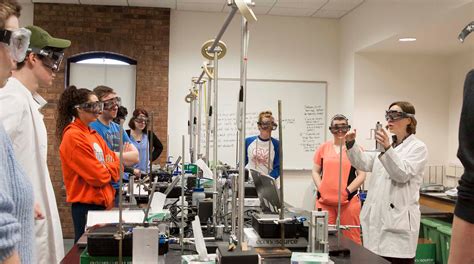Chemistry is a branch of science that studies the composition, structure, properties, and change of matter. It is a vast and complex subject that can be both challenging and rewarding.

Chemistry is typically offered as a high school class, but it can also be taken at the college level. There are some key differences between the two levels of chemistry.
High School Chemistry
High school chemistry is typically a one-year course that covers the basics of chemistry. Topics covered in high school chemistry include:
- The structure of atoms and molecules
- The periodic table of elements
- Chemical bonding
- Chemical reactions
- States of matter
- Acids and bases
High school chemistry is often taught in a lecture format, with students taking notes and completing assignments. Students may also conduct some simple experiments in the laboratory.
College Chemistry
College chemistry is typically a two-semester course that covers the fundamentals of chemistry in more depth than high school chemistry. Topics covered in college chemistry include:
- The structure of atoms and molecules
- The periodic table of elements
- Chemical bonding
- Chemical reactions
- States of matter
- Acids and bases
- Thermodynamics
- Kinetics
- Equilibrium
College chemistry is typically taught in a lecture format, with students taking notes and completing assignments. Students may also conduct more complex experiments in the laboratory.
Which Level of Chemistry Is Right for You?
The level of chemistry that you take depends on your individual needs and goals. If you are interested in pursuing a career in science, engineering, or medicine, then you will need to take college chemistry.
If you are not sure whether you want to pursue a career in science, then you may want to take high school chemistry. High school chemistry will give you a basic understanding of chemistry and help you to decide if you want to continue studying the subject in college.
Here are some tips for studying chemistry:
- Get organized. Keep your notes and assignments in a binder or folder. This will help you to stay on top of your work and make it easier to study for tests.
- Read the textbook. The textbook is a great resource for learning the material. Read each chapter carefully and take notes on the important concepts.
- Attend class regularly. Class is a great opportunity to learn from your instructor and classmates. Participate in discussions and ask questions when you do not understand something.
- Do your homework. Homework assignments help you to practice the material and identify areas where you need extra help.
- Study for tests. Start studying for tests early. Cramming at the last minute will not help you to do well.
- Get help when you need it. If you are struggling with a concept, do not be afraid to ask for help from your instructor, a tutor, or a classmate.
Chemistry is a challenging but rewarding subject. With hard work and dedication, you can succeed in chemistry and reach your goals.
Careers in Chemistry
There are many different career options available for people with a degree in chemistry. Some of the most common careers include:
- Chemical engineer
- Chemist
- Materials scientist
- Pharmacist
- Physician
- Science teacher
The median annual salary for chemists is $76,890. The top 10% of earners make more than $129,450 per year.
Conclusion
Chemistry is a vast and complex subject that can be both challenging and rewarding. The level of chemistry that you take depends on your individual needs and goals. With hard work and dedication, you can succeed in chemistry and reach your goals.
